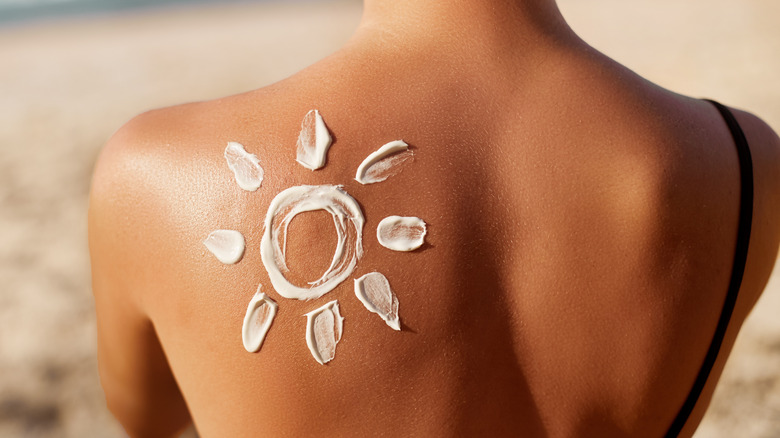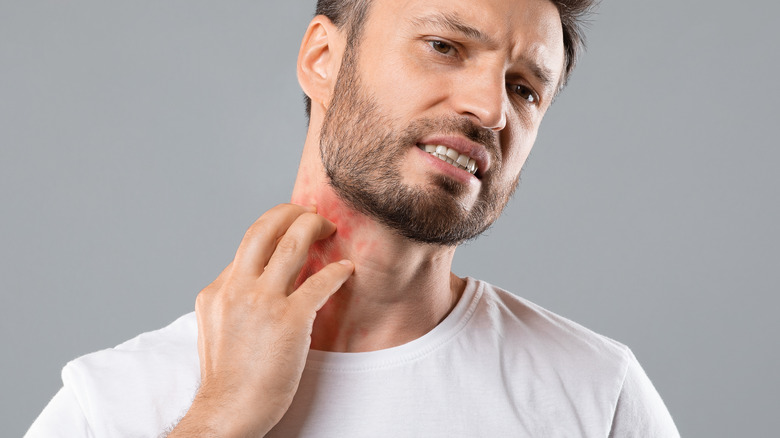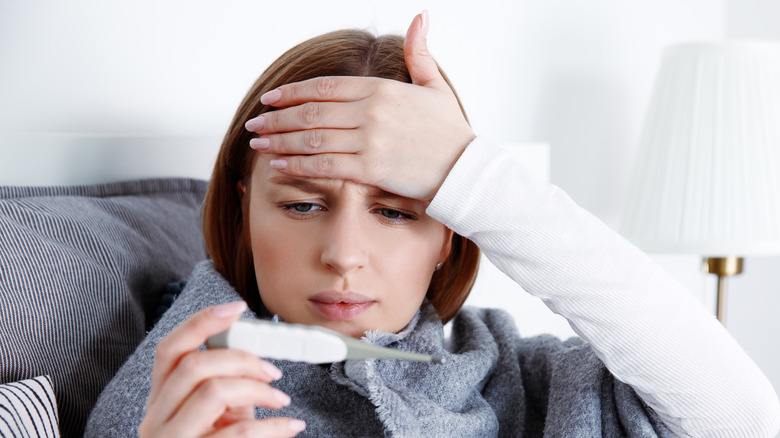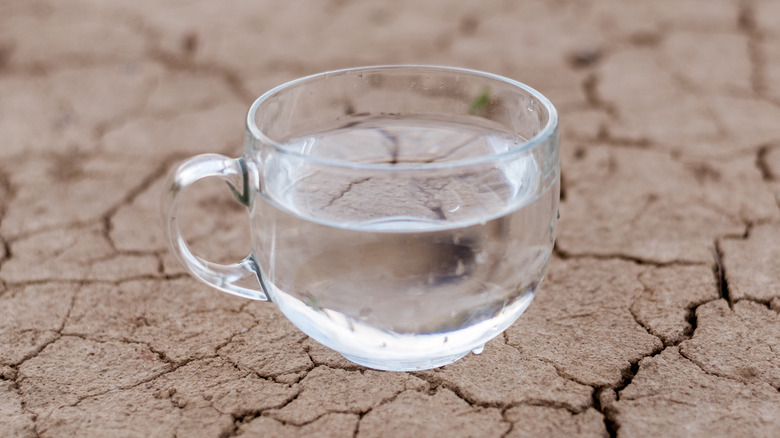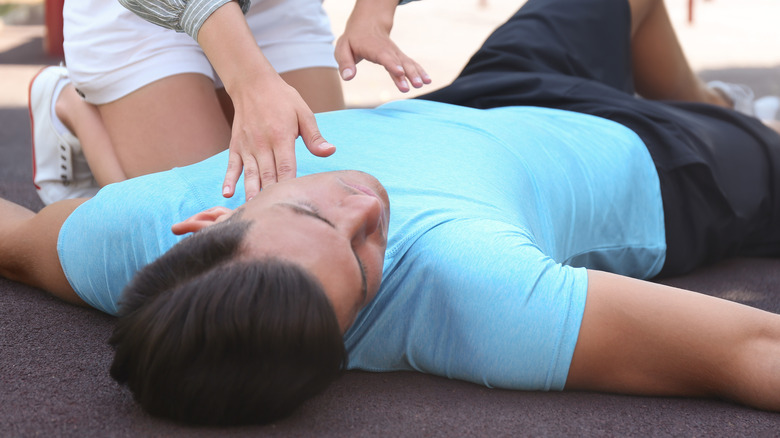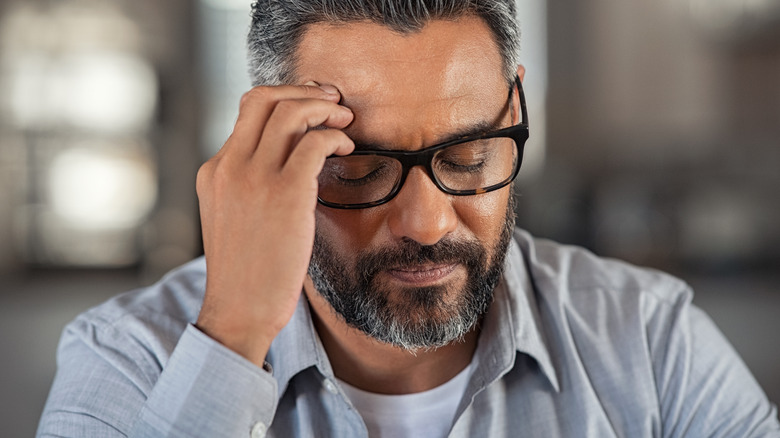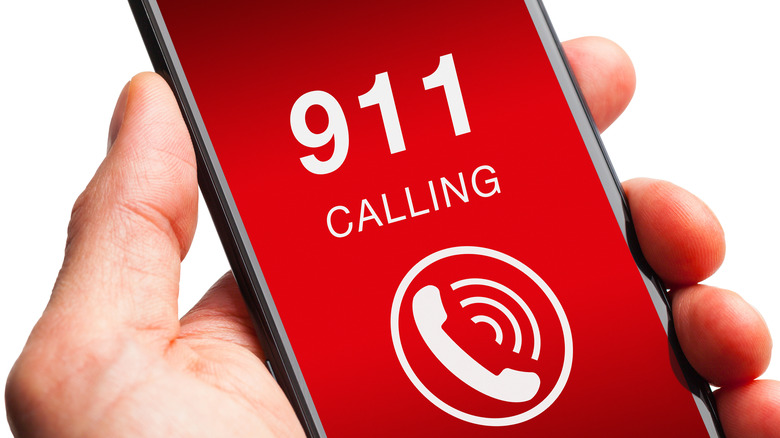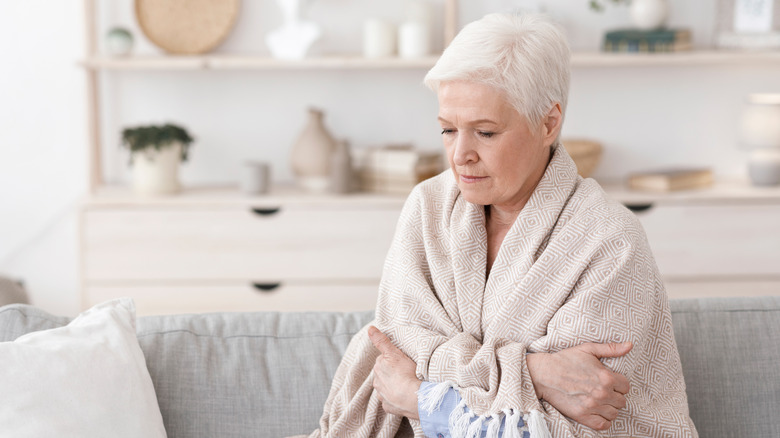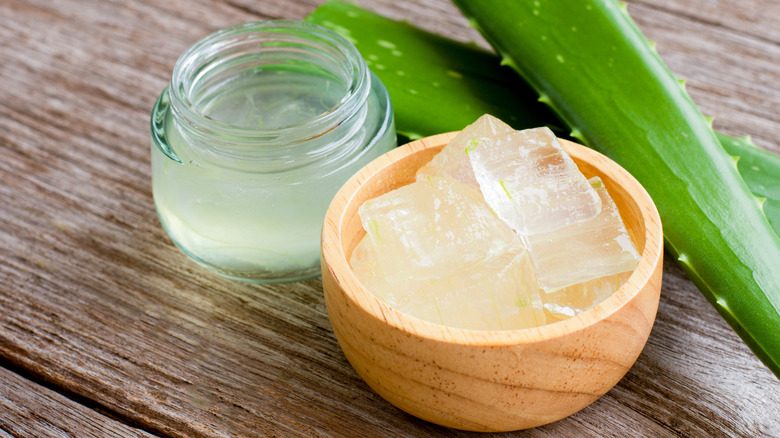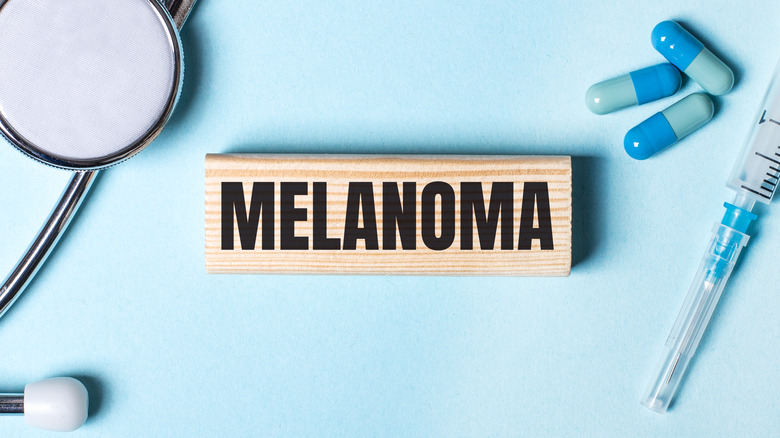Everything You Need To Know About Sun Poisoning
Imagine this: A person is lying out on a deck chair on a particularly sunny day. Since they're only planning to stay there for a few minutes, they don't bother with sunscreen. Soon, however, they doze off and don't wake up until more than an hour later. Immediately, they're concerned that they might have a sunburn, but their skin seems fine. Unfortunately, that person might be in for an unpleasant surprise before they go to bed that night. In reality, this person might not just have sunburn — they may also have sun poisoning.
More formally known as polymorphic light eruption, sun poisoning is a type of sun allergy, according to the Mayo Clinic. It's also considered by quite a few online sources as a severe sunburn, although it has symptoms that a mild sunburn doesn't (per GoodRx). Additionally, there's a greater chance you'll need medical help to properly treat sun poisoning. But despite their differences, the same precautions can help reduce the odds of developing either of these conditions.
Of course, the person in the above scenario should have used sunscreen to help protect their skin from sunburns and sun poisoning (via Mayo Clinic). However, while sunscreen is the most obvious measure a person can take to protect their skin, it alone might not be enough to avoid sun poisoning — especially if there are other factors that make someone more susceptible to the sun's UV rays.
The connection between sun poisoning and UV rays
Before we explore sun poisoning in greater detail, we also need to better understand ultraviolet (UV) radiation. Did you know that there are three main types of UV rays? Don't worry, remembering them is as easy as ABC. No, seriously — their names are ultraviolet A (UVA), ultraviolet B (UVB), and ultraviolet C (UVC), per the Centers for Disease Control and Prevention (CDC).
Now, here's a little good news when it comes to UV rays and sun poisoning. As the CDC explains, the ozone layer completely absorbs UVC rays, so they aren't a major concern when it comes to your health. But this is where the good news ends. Unfortunately, even though the ozone layer also absorbs UVB rays, it doesn't absorb all of these rays. That means you're still exposed to UVA and some UVB rays when you, for example, sunbathe on a beach.
So does that mean UVA rays are more dangerous than UVB rays? Well, while there are less UVB rays, they do penetrate the layers of your skin on a deeper level than UVA rays.
To be fair, sunlight is a great source of vitamin D (via CDC). In fact, the general recommendation from the World Health Organization (WHO) is to get up to 15 minutes of sunshine two to three times per week. That said, being exposed to UV rays over a prolonged period of time can lead to sun poisoning (per Jackson Health System).
Some medications increase odds of sun poisoning
If sun poisoning were a math equation, you might think it would be sun + unprotected skin = sun poisoning. If that helps you remember to wear sunscreen and take precautions to protect your skin, great, please use that equation as a helpful reminder. However, sun poisoning isn't as simple as 1+1=2.
As WebMD explains, some individuals are more likely to develop sun poisoning than others. So, it's possible for two people wearing identical outfits to be out in the sun for the same amount of time, and yet only one gets sun poisoning. Now, this could happen if one individual has fair hair or a light skin tone, since both can up the odds of sun poisoning. But a person is also more likely to develop sun poisoning if they take certain medications like birth control pills, antidepressants, antibiotics, and diuretics, as well as heart drugs and antibacterial medications. This is because these medications can increase the skin's sensitivity to sunlight.
If you are concerned about taking a medication because it might increase your chances of developing sun poisoning, speak with your health care professional about alternative treatments or ways you can minimize your risk. Also, fragrances can make your skin more sensitive to the sun, so be careful about how much you use. And one more note: There are other risk factors when it comes to sun poisoning.
Medical conditions and sun poisoning
While medications can make someone more susceptible to sun poisoning (via WebMD), they aren't the only things to keep in mind when it comes to this health problem. As Insider explains, there are medical conditions that can also increase the sensitivity of one's skin when it comes to sunlight. And once their skin becomes more sensitive to the sun, they're more likely to develop sun poisoning.
Two conditions that are known for affecting one's skin are also associated with an increased chance of developing sun poisoning. One of these is eczema, which might be surprising to some, since exposing eczema-impacted skin to sunlight can be helpful. However, some versions of eczema can make one's skin hypersensitive to the sun's rays, which raises the odds not only of sun poisoning, but also of getting sunburned. Additionally, someone with rosacea is usually more sensitive to sunlight, which can leave them more vulnerable to sun poisoning. A couple of common symptoms of rosacea are facial flushing and bumps.
Besides eczema and rosacea, having lupus can also make one's skin more sensitive to sunlight, and thus more susceptible to sun poisoning. In fact, this autoimmune disease can affect someone's skin so much that a person with lupus should put on sunscreen as part of their daily routine, regardless of what activities they have planned.
Symptom: Rash and/or blisters
Although the WHO recommends up to 15 minutes of exposure to the sun two to three times per week (per the CDC), it's important to note that sunburns can happen very quickly. In fact, according to the University of Pittsburgh Schools of the Health Sciences (UPMC), a person can get sunburned in less than 15 minutes — and of course, a longer period of sun exposure can cause sun poisoning.
While both sun poisoning and sunburns can make one's skin redder, sun poisoning can cause blisters. Sometimes these blisters are small, but that doesn't mean they can't be unpleasant. These little fluid-filled white bumps tend to be very itchy and can cause pain. And if someone has a more severe case of sun poisoning, they could experience large blisters. Plus, sun poisoning can cause a rash that can make one look like they're breaking out into hives. And while symptoms of sun poisoning sometimes only linger for a couple of days, it is possible for the effects of sun poisoning to not go away for weeks after being initially exposed to the sun.
So, what can you do if you have sun poisoning? For starters, there are ways to help treat your skin like using coconut oil or an anti-itch cream. However, always check with a health care professional before using anything on your skin, especially if you have sun poisoning.
Symptom: Feeling under the weather
It's easy to focus on the surface problems of sun poisoning like reddened skin, rashes, and blisters (via Parkview Health). However, sun poisoning can also affect how you feel, and can even trick you into thinking you're coming down with something.
As board-certified dermatologist Dr. Tsipporah Shainhouse told Self, "Sun poisoning often feels like the flu or even an allergic reaction." Now, keep in mind that it's possible for two people to both have sun poisoning but not display the exact same symptoms. With that said, there are a few common ones that can be red flags of sun poisoning, especially if they're accompanied by a rash or blisters. These include having an elevated body temperature, as well as feeling achy and lethargic.
There's another reason why it's possible to mistake some sun poisoning symptoms for the flu. According to Dr. Apple Bodemer, associate professor of dermatology at the University of Wisconsin-Madison, a typical time of year when people get sun poisoning can lead some to at least initially think they're getting sick with the flu. "Probably the most common way that it [sun poisoning] occurs is when people who haven't been in the sun a lot go for that winter-break beach vacation and forget to cover up or apply enough sunscreen on their first day out," she told Self. So, someone with sun poisoning might assume they caught the flu virus before they left on their trip.
Symptom: Dehydration
Let's be clear — a person can become dehydrated and never set foot in the sun. After all, as Medical News Today explains, dehydration is when someone not only loses fluids like water from their body, but also doesn't take in enough fluids to fully replenish what they've lost. So, someone playing an indoor game of basketball who doesn't stay hydrated can sweat and become dehydrated. However, dehydration can also happen because of sun poisoning, according to the Cleveland Clinic.
Now, in case you're thinking it's easy to avoid dehydration if you just drink something when you feel thirsty, keep in mind that thirst is only usually a red flag of dehydration (via Medical News Today). That means it's possible to become dehydrated and not feel thirsty at all. Also, there are different stages of dehydration that can cause a variety of unpleasant symptoms, some of which are the same as the symptoms of sun poisoning. For example, being moderately dehydrated can make your muscles feel weak, your mouth dry, and give you a headache. Being severely dehydrated can elevate one's body temperature, drop one's blood pressure, cause one's eyes to become sunken in, and even lead to a person passing out.
Whether or not someone experiences dehydration because of sun poisoning, they need to take it seriously. If not addressed, mild dehydration can progress to severe dehydration. When or if that happens, get medical help.
Symptom: Fainting
Before we talk about fainting spells and sun poisoning, it's important to understand that terms we use interchangeably — dizziness and lightheadedness — could be misinterpreted if you try to describe symptoms of sun poisoning to a medical professional. According to Health Direct, a person who is dizzy and unsteady might say, "the room feels like it's spinning." A lightheaded person, on the other hand, might say, "I feel like I'm going to pass out at any moment."
The point is, describing exactly what you're feeling in detail can help you avoid misunderstandings. And you definitely want everyone near you to be aware you could lose consciousness, which is a real possibility if you have sun poisoning, per the Center for Dermatology and Laser Skin Surgery. After all, fainting (especially from a standing position) can cause injuries, including those to the head. And as Johns Hopkins explains, head injuries can not only lead to disabilities, but can also be fatal. Specifically, a head injury could affect just the surface (a.k.a. the scalp), or could be severe enough to impact one's skull, their brain, or even their circulatory system.
Whether or not you have sun poisoning, if you begin to feel like you're going to faint, Health Direct recommends getting off your feet right away. You can sit or lie down (whichever you feel more comfortable doing). And make sure to let someone know you feel faint, just in case you do lose consciousness.
Symptom: Stomach problems
Picture this scenario: You're hanging out with your friend on a hot summer's day. But while you've taken precautions like wearing sunscreen, your friend has taken no precautions. Later, your friend suddenly feels sick to their stomach and has to run to a local restroom to vomit.
While it's possible that your friend is coming down with something, they also could be experiencing a symptom of sun poisoning. According to HCA Florida Healthcare, vomiting can be a symptom of severe sun poisoning where you should seek medical help. Otherwise, you run the risk of developing heatstroke (a.k.a. sunstroke). If this happens, then your body can become overheated, per Mayo Clinic. In fact, if someone were to take your temperature with a rectal thermometer, it likely would be 104 degrees Fahrenheit if you had heatstroke. Other possible red flags that your body is overheating include slurred speech, nausea, accelerated pulse, rapid and shallow breathing, confusion, and a throbbing headache.
If you or someone you know has heatstroke, it is crucial to seek emergency help (via Mayo Clinic). Heatstroke has been known to cause serious complications to one's muscles, heart, kidneys, and brain. In fact, a person could experience brain damage as a result of heatstroke. In addition, heatstroke can be fatal. One more note: HCA Florida Healthcare explains that other signs of severe sun poisoning (which can lead to heatstroke) include fainting, headaches, pain, and a body temperature of more than 101 degrees Fahrenheit.
Symptom: Headache
Anyone who regularly gets headaches will tell you that a number of things can cause them. Blaring loud music, on the job stress, or even wearing a tight headband can all be culprits. However, so can sun poisoning. As Medical News Today explains, while it's easy to focus on how sun poisoning affects one's skin, it can also give someone a headache. In fact, HCA Florida Healthcare states that headaches can be a sign of severe sun poisoning.
Now, severe sun poisoning can lead to heatstroke. But it can also cause another condition called heat exhaustion, according to Convenient MD Urgent Care. Remember, there are three different heat-related syndromes (via Mayo Clinic). And while heat exhaustion is not as severe as heat stroke, it still can cause symptoms like fatigue, fainting, nausea, changes in one's heartrate, and headaches. In addition, head exhaustion can cause one's blood pressure to drop when they, for example, go from a sitting position to a standing position.
Although heat exhaustion can happen suddenly, it also might be more gradual (per Mayo Clinic). So, if you experience a headache and think it might be either sun poisoning or heat exhaustion, don't hesitate to seek medical help, especially if you have other symptoms of either condition. Specifically, if you believe you have heat exhaustion, contact a health care professional if your symptoms become severe or don't begin to get better within an hour.
Can you go into shock because of sun poisoning?
The word "shock" gets thrown around quite a bit. People will say things like how they were shocked by a story in the news or by something someone said. But make no mistake, the medical condition known as shock is entirely different than just being very surprised.
Remember, the body needs oxygen, but when a person is in physical shock, their circulatory system can't properly transport oxygen to both the tissues and organs of the body (per MedlinePlus). This can be very dangerous, causing drops in blood pressure and even resulting in death. And as MedicineNet points out, sun poisoning can lead to shock. In fact, some of the symptoms of sun poisoning and shock are the same, like an accelerated heartrate, rapid breathing, confusion, and losing consciousness. In addition, a person in shock could urinate less or not at all, which can also occur in connection with another sun poisoning red flag: dehydration.
Although sun poisoning can cause someone to go into shock, it is far from the only reason a person might experience this serious medical condition. According to MedlinePlus, there are many reasons someone could go into shock, including insect bites, injuries, blood loss, dehydration, and issues involving the nervous or circulatory system. Even if sun poisoning isn't the reason why someone goes into shock, you should still treat them being in shock as a medical emergency and call 911 immediately.
Additional symptoms
We've explored quite a few possible symptoms of sun poisoning. However, there are still more potential signs of this ailment. And some of them overlap with other symptoms discussed in this article.
For example, we've talked about how sun poisoning can make your skin painful, especially to the touch. But as Carris Health CentraCare notes, your skin could also feel tingly as a result of sun poisoning. In fact, you could experience both pain and tingling sensations at the same time. And despite how your body's temperature could rise because of sun poisoning, you could also have chills. Though they may sound like opposite conditions, they can happen simultaneously. And while dizziness and lightheadedness are both possible red flags of sun poisoning, so is another cognitive concern — confusion. Plus, sun poisoning can lead to not just reddening of the skin but also swelling, including in the face.
Yes, sun poisoning can have a number of symptoms, but there is one more important thing to keep in mind. While it's good to be aware of the signs of sun poisoning, you shouldn't treat these symptoms like a bingo card where you need to mark off so many before you seek medical help. Even if you only have one or two symptoms of sun poisoning, don't hesitate to seek medical assistance. Remember, if you have any concerns about your health and wellbeing (sun poisoning-related or otherwise), it's better to be safe than sorry.
Treatments for sun poisoning
If you have sun poisoning (especially a severe case of it), you should seek medical help right away. Fortunately, there are some simple ways to treat sun poisoning and help your body heal. Just remember: It's always wise to talk with a health care professional about any treatments before trying them.
According to Emerald Coast Urgent Care, topical treatments like applying aloe vera gel or take a bath in Epsom salts can both aid with sun poisoning. This is because both of these treatments can help to reduce inflammation, which can help take the sting out of sun poisoning-related burns. Also, Epsom salt can help with other sun poisoning symptoms like hives and swelling, and aloe vera can help sun poisoning blisters heal. Just be careful about the temperature of an Epsom salts bath. As PhysicianOne Urgent Care explains, you should soak in cool (not cold) baths for sun poisoning. This advice extends to showers and compresses.
Besides what you put on your skin, what you eat and drink can also help with sun poisoning, per Emerald Coast Urgent Care. Foods rich in either vitamins E or C can help your skin heal. In fact, you can also take a vitamin E supplement or apply it directly to your skin. You should also hydrate, since dehydration and sun poisoning can go hand in hand. And of course, get out and stay out of the sun (via PhysicianOne Urgent Care).
Can you develop skin cancer from sun poisoning?
While sun poisoning doesn't mean someone has actually been poisoned, it can be dangerous. As Healthy Me PA notes, your chances of developing skin cancer go up if you don't address your sun poisoning right away and properly treat it. This is because the UV radiation in the sun's rays can damage your DNA, according to Short Hills Dermatology Consultants. And damaged DNA can cause mutations in your skin's cells, which can lead to cancerous tumors (per the Skin Cancer Foundation).
While we think of skin cancer as one ailment, it's actually an umbrella term for different skin problems, all of which can be very serious. One of the most dangerous (and arguably one of the better known) of these is melanoma. However, others include basal cell carcinomas and squamous cell carcinoma. All three have two things in common: Sun exposure can cause all of them, and they all can be deadly (although basal cell carcinomas aren't usually fatal).
In addition to these skin cancers, Merkel cell carcinoma has a connection to sun exposure and sun poisoning. Unlike the above conditions, this type of skin cancer typically happens in connection to a virus. However, Merkel cell carcinoma usually manifests itself on skin that is exposed to the sun. This skin cancer usually occurs in people who are more than 50 years old and have fair skin.
How to lower your chances of sun poisoning
Of course, the best way to avoid all the possible problems that can happen because of sun poisoning is by avoiding experiencing sun poisoning at all. The good news is that a little proactiveness can help you lower your chances of sun poisoning.
First, make sure you're aware of all the possible risk factors for sun poisoning, including where you live. As Mohawk Valley Health System explains, people who live near the equator and/or at high altitudes are more likely to develop sun poisoning. Also, do you regularly go to the beach, or do your hobbies involve snow? Either can up your chances of sun poisoning, since water, sand, and snow can reflect and magnify the sun's rays. Other possible risk factors include chemical peels, topically applied citrus oils, supplements like St. John's wort, and cases of skin cancer in your family's medical history.
You should also take certain precautions to reduce your odds of sun poisoning. These include wearing broad-spectrum protection sunscreen and reapplying it right after swimming or even if you're just sweating. You should still reapply sunscreen every two hours, even if you're not swimming or sweating. Also, try not to be out in the sun from 10 a.m. to 2 p.m., and don't forget to wear protective clothes and sunglasses.

